Dissertation Proposal: Efficacy of Arbitration Process in Gulf Council
VerifiedAdded on 2020/01/15
|12
|3750
|258
Project
AI Summary
This dissertation proposal outlines a research project evaluating the efficacy of the arbitration process within the Gulf Commercial Council (GCC). The proposal details the research aim, objectives, and a comprehensive literature review, discussing the significance of arbitration in the UAE and the role of arbitration centers. It outlines the research methodologies, including a deductive approach and positivism philosophy, along with data collection methods using secondary sources. The proposal also describes the research design, data analysis techniques, ethical considerations, and limitations of the study. The aim is to assess the effectiveness of arbitration within the GCC, considering its advantages, principles, and potential drawbacks, providing a structured framework for the dissertation.
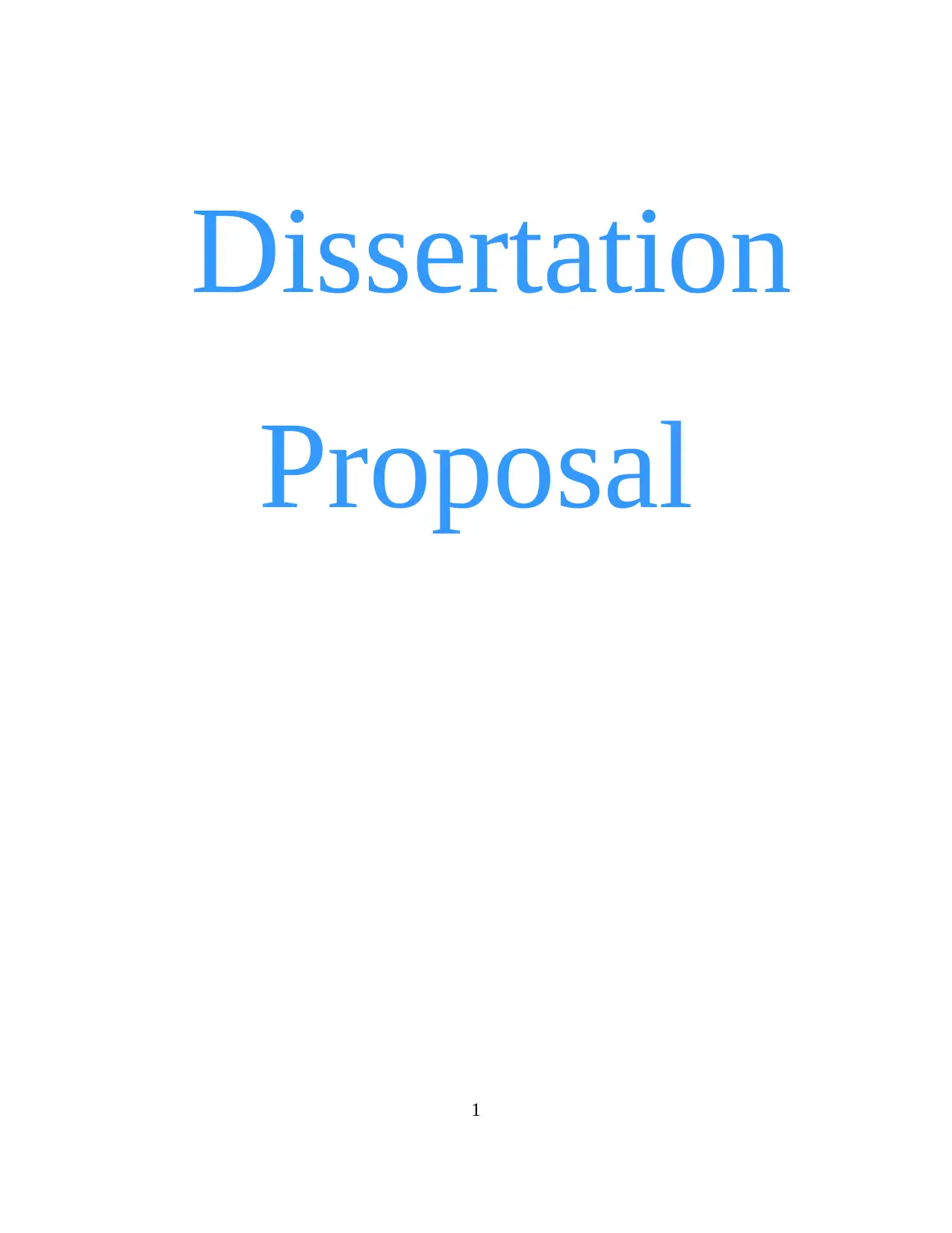
Dissertation
Proposal
1
Proposal
1
Paraphrase This Document
Need a fresh take? Get an instant paraphrase of this document with our AI Paraphraser
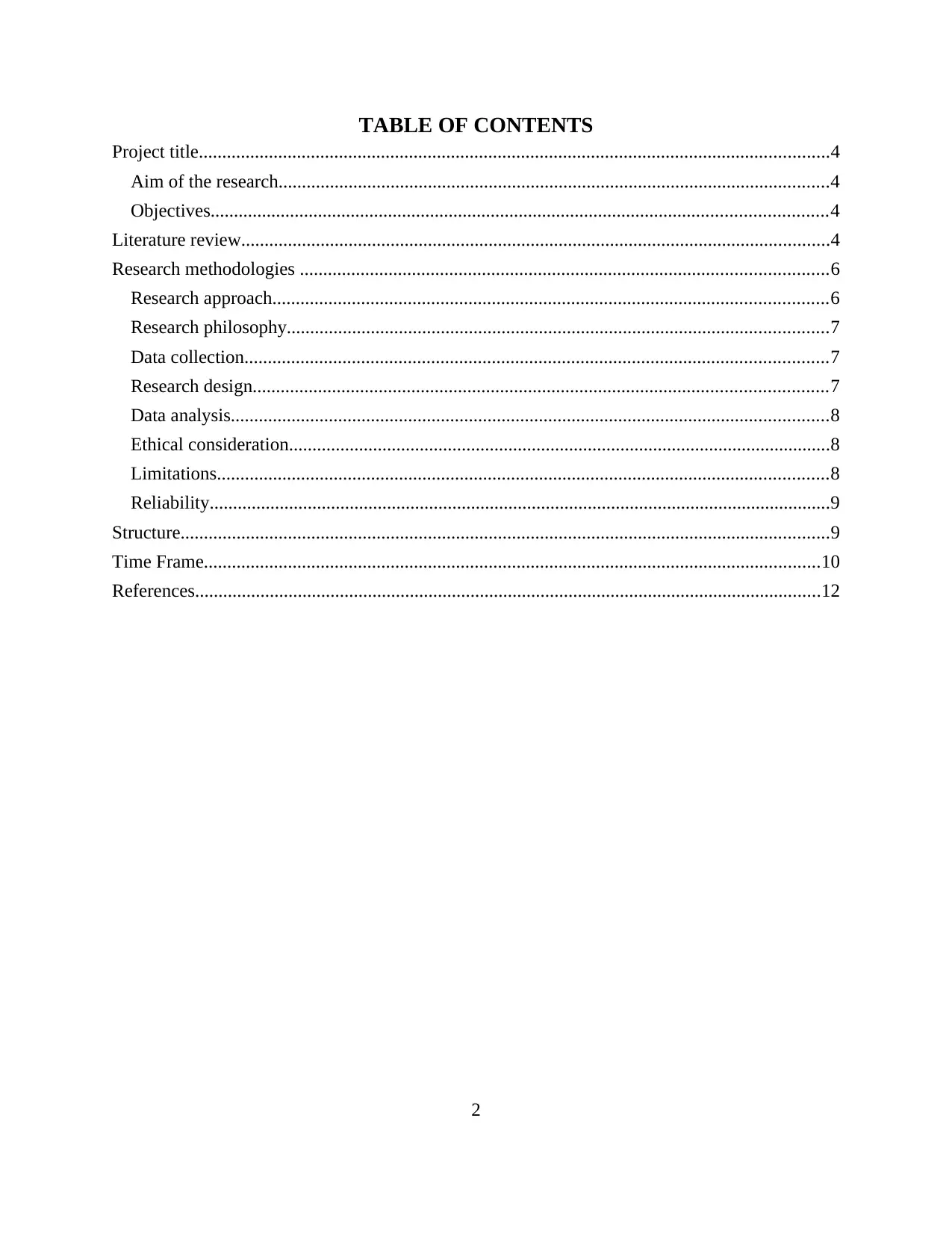
TABLE OF CONTENTS
Project title.......................................................................................................................................4
Aim of the research......................................................................................................................4
Objectives....................................................................................................................................4
Literature review..............................................................................................................................4
Research methodologies .................................................................................................................6
Research approach.......................................................................................................................6
Research philosophy....................................................................................................................7
Data collection.............................................................................................................................7
Research design...........................................................................................................................7
Data analysis................................................................................................................................8
Ethical consideration....................................................................................................................8
Limitations...................................................................................................................................8
Reliability.....................................................................................................................................9
Structure...........................................................................................................................................9
Time Frame....................................................................................................................................10
References......................................................................................................................................12
2
Project title.......................................................................................................................................4
Aim of the research......................................................................................................................4
Objectives....................................................................................................................................4
Literature review..............................................................................................................................4
Research methodologies .................................................................................................................6
Research approach.......................................................................................................................6
Research philosophy....................................................................................................................7
Data collection.............................................................................................................................7
Research design...........................................................................................................................7
Data analysis................................................................................................................................8
Ethical consideration....................................................................................................................8
Limitations...................................................................................................................................8
Reliability.....................................................................................................................................9
Structure...........................................................................................................................................9
Time Frame....................................................................................................................................10
References......................................................................................................................................12
2
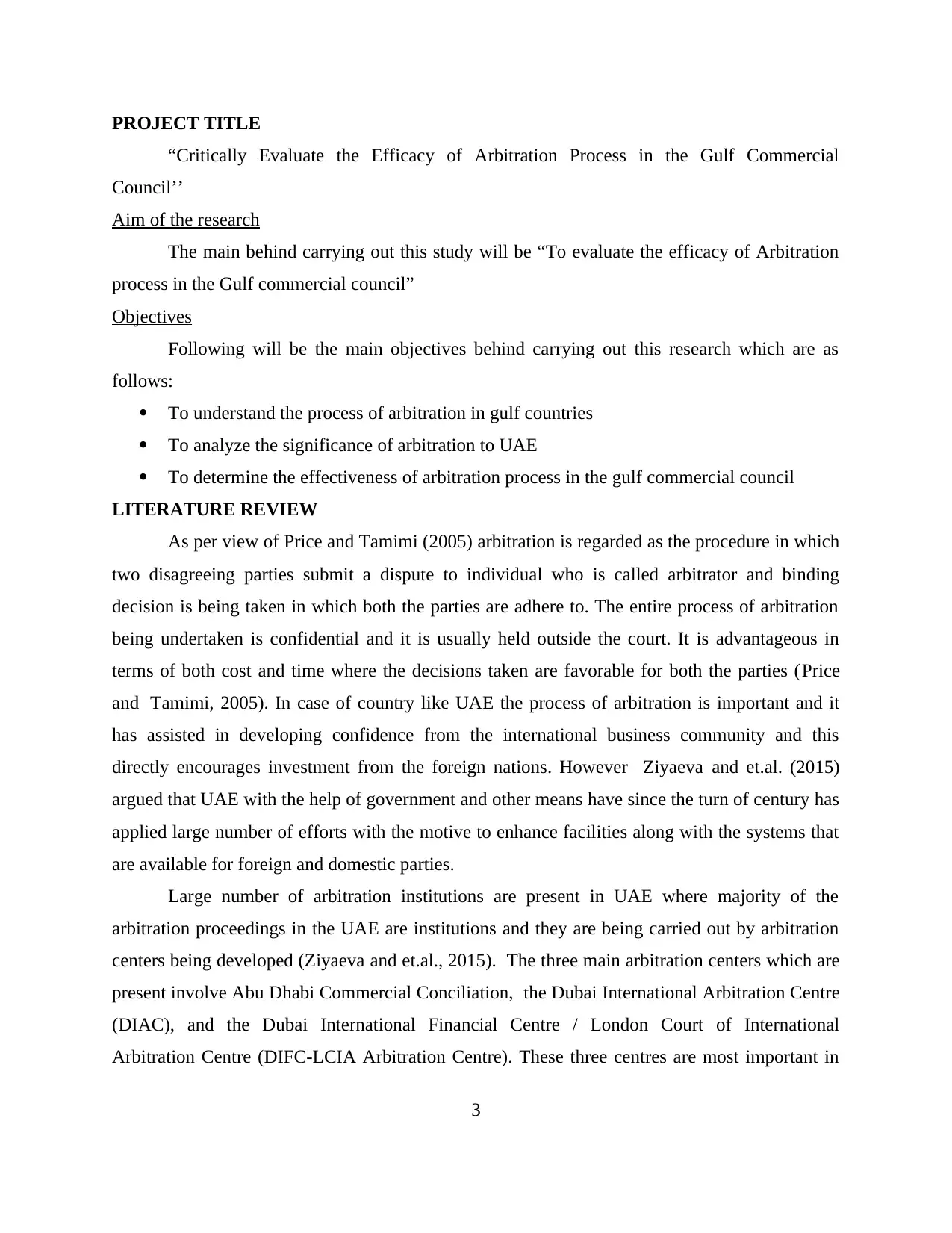
PROJECT TITLE
“Critically Evaluate the Efficacy of Arbitration Process in the Gulf Commercial
Council’’
Aim of the research
The main behind carrying out this study will be “To evaluate the efficacy of Arbitration
process in the Gulf commercial council”
Objectives
Following will be the main objectives behind carrying out this research which are as
follows:
To understand the process of arbitration in gulf countries
To analyze the significance of arbitration to UAE
To determine the effectiveness of arbitration process in the gulf commercial council
LITERATURE REVIEW
As per view of Price and Tamimi (2005) arbitration is regarded as the procedure in which
two disagreeing parties submit a dispute to individual who is called arbitrator and binding
decision is being taken in which both the parties are adhere to. The entire process of arbitration
being undertaken is confidential and it is usually held outside the court. It is advantageous in
terms of both cost and time where the decisions taken are favorable for both the parties (Price
and Tamimi, 2005). In case of country like UAE the process of arbitration is important and it
has assisted in developing confidence from the international business community and this
directly encourages investment from the foreign nations. However Ziyaeva and et.al. (2015)
argued that UAE with the help of government and other means have since the turn of century has
applied large number of efforts with the motive to enhance facilities along with the systems that
are available for foreign and domestic parties.
Large number of arbitration institutions are present in UAE where majority of the
arbitration proceedings in the UAE are institutions and they are being carried out by arbitration
centers being developed (Ziyaeva and et.al., 2015). The three main arbitration centers which are
present involve Abu Dhabi Commercial Conciliation, the Dubai International Arbitration Centre
(DIAC), and the Dubai International Financial Centre / London Court of International
Arbitration Centre (DIFC-LCIA Arbitration Centre). These three centres are most important in
3
“Critically Evaluate the Efficacy of Arbitration Process in the Gulf Commercial
Council’’
Aim of the research
The main behind carrying out this study will be “To evaluate the efficacy of Arbitration
process in the Gulf commercial council”
Objectives
Following will be the main objectives behind carrying out this research which are as
follows:
To understand the process of arbitration in gulf countries
To analyze the significance of arbitration to UAE
To determine the effectiveness of arbitration process in the gulf commercial council
LITERATURE REVIEW
As per view of Price and Tamimi (2005) arbitration is regarded as the procedure in which
two disagreeing parties submit a dispute to individual who is called arbitrator and binding
decision is being taken in which both the parties are adhere to. The entire process of arbitration
being undertaken is confidential and it is usually held outside the court. It is advantageous in
terms of both cost and time where the decisions taken are favorable for both the parties (Price
and Tamimi, 2005). In case of country like UAE the process of arbitration is important and it
has assisted in developing confidence from the international business community and this
directly encourages investment from the foreign nations. However Ziyaeva and et.al. (2015)
argued that UAE with the help of government and other means have since the turn of century has
applied large number of efforts with the motive to enhance facilities along with the systems that
are available for foreign and domestic parties.
Large number of arbitration institutions are present in UAE where majority of the
arbitration proceedings in the UAE are institutions and they are being carried out by arbitration
centers being developed (Ziyaeva and et.al., 2015). The three main arbitration centers which are
present involve Abu Dhabi Commercial Conciliation, the Dubai International Arbitration Centre
(DIAC), and the Dubai International Financial Centre / London Court of International
Arbitration Centre (DIFC-LCIA Arbitration Centre). These three centres are most important in
3
⊘ This is a preview!⊘
Do you want full access?
Subscribe today to unlock all pages.

Trusted by 1+ million students worldwide
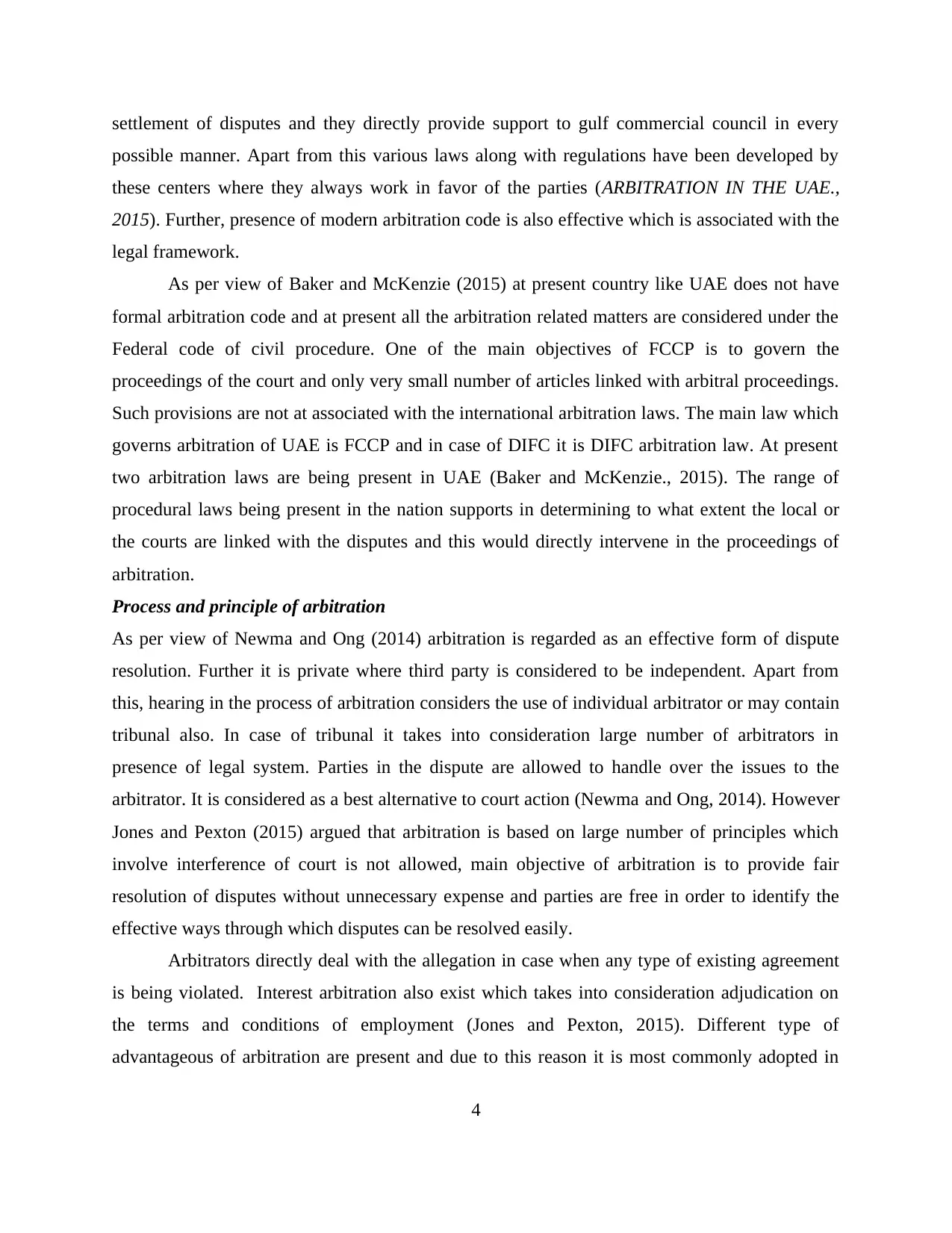
settlement of disputes and they directly provide support to gulf commercial council in every
possible manner. Apart from this various laws along with regulations have been developed by
these centers where they always work in favor of the parties (ARBITRATION IN THE UAE.,
2015). Further, presence of modern arbitration code is also effective which is associated with the
legal framework.
As per view of Baker and McKenzie (2015) at present country like UAE does not have
formal arbitration code and at present all the arbitration related matters are considered under the
Federal code of civil procedure. One of the main objectives of FCCP is to govern the
proceedings of the court and only very small number of articles linked with arbitral proceedings.
Such provisions are not at associated with the international arbitration laws. The main law which
governs arbitration of UAE is FCCP and in case of DIFC it is DIFC arbitration law. At present
two arbitration laws are being present in UAE (Baker and McKenzie., 2015). The range of
procedural laws being present in the nation supports in determining to what extent the local or
the courts are linked with the disputes and this would directly intervene in the proceedings of
arbitration.
Process and principle of arbitration
As per view of Newma and Ong (2014) arbitration is regarded as an effective form of dispute
resolution. Further it is private where third party is considered to be independent. Apart from
this, hearing in the process of arbitration considers the use of individual arbitrator or may contain
tribunal also. In case of tribunal it takes into consideration large number of arbitrators in
presence of legal system. Parties in the dispute are allowed to handle over the issues to the
arbitrator. It is considered as a best alternative to court action (Newma and Ong, 2014). However
Jones and Pexton (2015) argued that arbitration is based on large number of principles which
involve interference of court is not allowed, main objective of arbitration is to provide fair
resolution of disputes without unnecessary expense and parties are free in order to identify the
effective ways through which disputes can be resolved easily.
Arbitrators directly deal with the allegation in case when any type of existing agreement
is being violated. Interest arbitration also exist which takes into consideration adjudication on
the terms and conditions of employment (Jones and Pexton, 2015). Different type of
advantageous of arbitration are present and due to this reason it is most commonly adopted in
4
possible manner. Apart from this various laws along with regulations have been developed by
these centers where they always work in favor of the parties (ARBITRATION IN THE UAE.,
2015). Further, presence of modern arbitration code is also effective which is associated with the
legal framework.
As per view of Baker and McKenzie (2015) at present country like UAE does not have
formal arbitration code and at present all the arbitration related matters are considered under the
Federal code of civil procedure. One of the main objectives of FCCP is to govern the
proceedings of the court and only very small number of articles linked with arbitral proceedings.
Such provisions are not at associated with the international arbitration laws. The main law which
governs arbitration of UAE is FCCP and in case of DIFC it is DIFC arbitration law. At present
two arbitration laws are being present in UAE (Baker and McKenzie., 2015). The range of
procedural laws being present in the nation supports in determining to what extent the local or
the courts are linked with the disputes and this would directly intervene in the proceedings of
arbitration.
Process and principle of arbitration
As per view of Newma and Ong (2014) arbitration is regarded as an effective form of dispute
resolution. Further it is private where third party is considered to be independent. Apart from
this, hearing in the process of arbitration considers the use of individual arbitrator or may contain
tribunal also. In case of tribunal it takes into consideration large number of arbitrators in
presence of legal system. Parties in the dispute are allowed to handle over the issues to the
arbitrator. It is considered as a best alternative to court action (Newma and Ong, 2014). However
Jones and Pexton (2015) argued that arbitration is based on large number of principles which
involve interference of court is not allowed, main objective of arbitration is to provide fair
resolution of disputes without unnecessary expense and parties are free in order to identify the
effective ways through which disputes can be resolved easily.
Arbitrators directly deal with the allegation in case when any type of existing agreement
is being violated. Interest arbitration also exist which takes into consideration adjudication on
the terms and conditions of employment (Jones and Pexton, 2015). Different type of
advantageous of arbitration are present and due to this reason it is most commonly adopted in
4
Paraphrase This Document
Need a fresh take? Get an instant paraphrase of this document with our AI Paraphraser
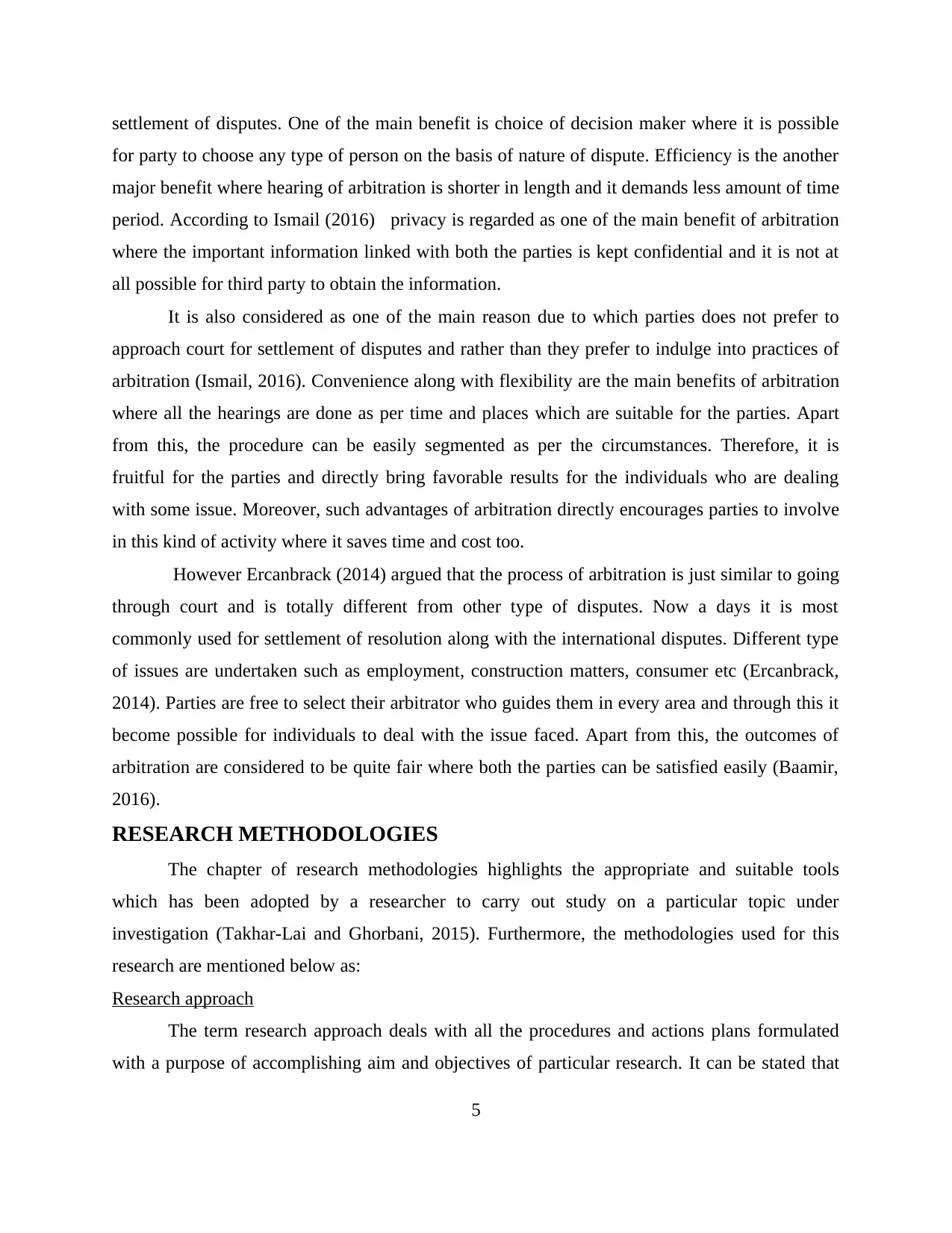
settlement of disputes. One of the main benefit is choice of decision maker where it is possible
for party to choose any type of person on the basis of nature of dispute. Efficiency is the another
major benefit where hearing of arbitration is shorter in length and it demands less amount of time
period. According to Ismail (2016) privacy is regarded as one of the main benefit of arbitration
where the important information linked with both the parties is kept confidential and it is not at
all possible for third party to obtain the information.
It is also considered as one of the main reason due to which parties does not prefer to
approach court for settlement of disputes and rather than they prefer to indulge into practices of
arbitration (Ismail, 2016). Convenience along with flexibility are the main benefits of arbitration
where all the hearings are done as per time and places which are suitable for the parties. Apart
from this, the procedure can be easily segmented as per the circumstances. Therefore, it is
fruitful for the parties and directly bring favorable results for the individuals who are dealing
with some issue. Moreover, such advantages of arbitration directly encourages parties to involve
in this kind of activity where it saves time and cost too.
However Ercanbrack (2014) argued that the process of arbitration is just similar to going
through court and is totally different from other type of disputes. Now a days it is most
commonly used for settlement of resolution along with the international disputes. Different type
of issues are undertaken such as employment, construction matters, consumer etc (Ercanbrack,
2014). Parties are free to select their arbitrator who guides them in every area and through this it
become possible for individuals to deal with the issue faced. Apart from this, the outcomes of
arbitration are considered to be quite fair where both the parties can be satisfied easily (Baamir,
2016).
RESEARCH METHODOLOGIES
The chapter of research methodologies highlights the appropriate and suitable tools
which has been adopted by a researcher to carry out study on a particular topic under
investigation (Takhar-Lai and Ghorbani, 2015). Furthermore, the methodologies used for this
research are mentioned below as:
Research approach
The term research approach deals with all the procedures and actions plans formulated
with a purpose of accomplishing aim and objectives of particular research. It can be stated that
5
for party to choose any type of person on the basis of nature of dispute. Efficiency is the another
major benefit where hearing of arbitration is shorter in length and it demands less amount of time
period. According to Ismail (2016) privacy is regarded as one of the main benefit of arbitration
where the important information linked with both the parties is kept confidential and it is not at
all possible for third party to obtain the information.
It is also considered as one of the main reason due to which parties does not prefer to
approach court for settlement of disputes and rather than they prefer to indulge into practices of
arbitration (Ismail, 2016). Convenience along with flexibility are the main benefits of arbitration
where all the hearings are done as per time and places which are suitable for the parties. Apart
from this, the procedure can be easily segmented as per the circumstances. Therefore, it is
fruitful for the parties and directly bring favorable results for the individuals who are dealing
with some issue. Moreover, such advantages of arbitration directly encourages parties to involve
in this kind of activity where it saves time and cost too.
However Ercanbrack (2014) argued that the process of arbitration is just similar to going
through court and is totally different from other type of disputes. Now a days it is most
commonly used for settlement of resolution along with the international disputes. Different type
of issues are undertaken such as employment, construction matters, consumer etc (Ercanbrack,
2014). Parties are free to select their arbitrator who guides them in every area and through this it
become possible for individuals to deal with the issue faced. Apart from this, the outcomes of
arbitration are considered to be quite fair where both the parties can be satisfied easily (Baamir,
2016).
RESEARCH METHODOLOGIES
The chapter of research methodologies highlights the appropriate and suitable tools
which has been adopted by a researcher to carry out study on a particular topic under
investigation (Takhar-Lai and Ghorbani, 2015). Furthermore, the methodologies used for this
research are mentioned below as:
Research approach
The term research approach deals with all the procedures and actions plans formulated
with a purpose of accomplishing aim and objectives of particular research. It can be stated that
5
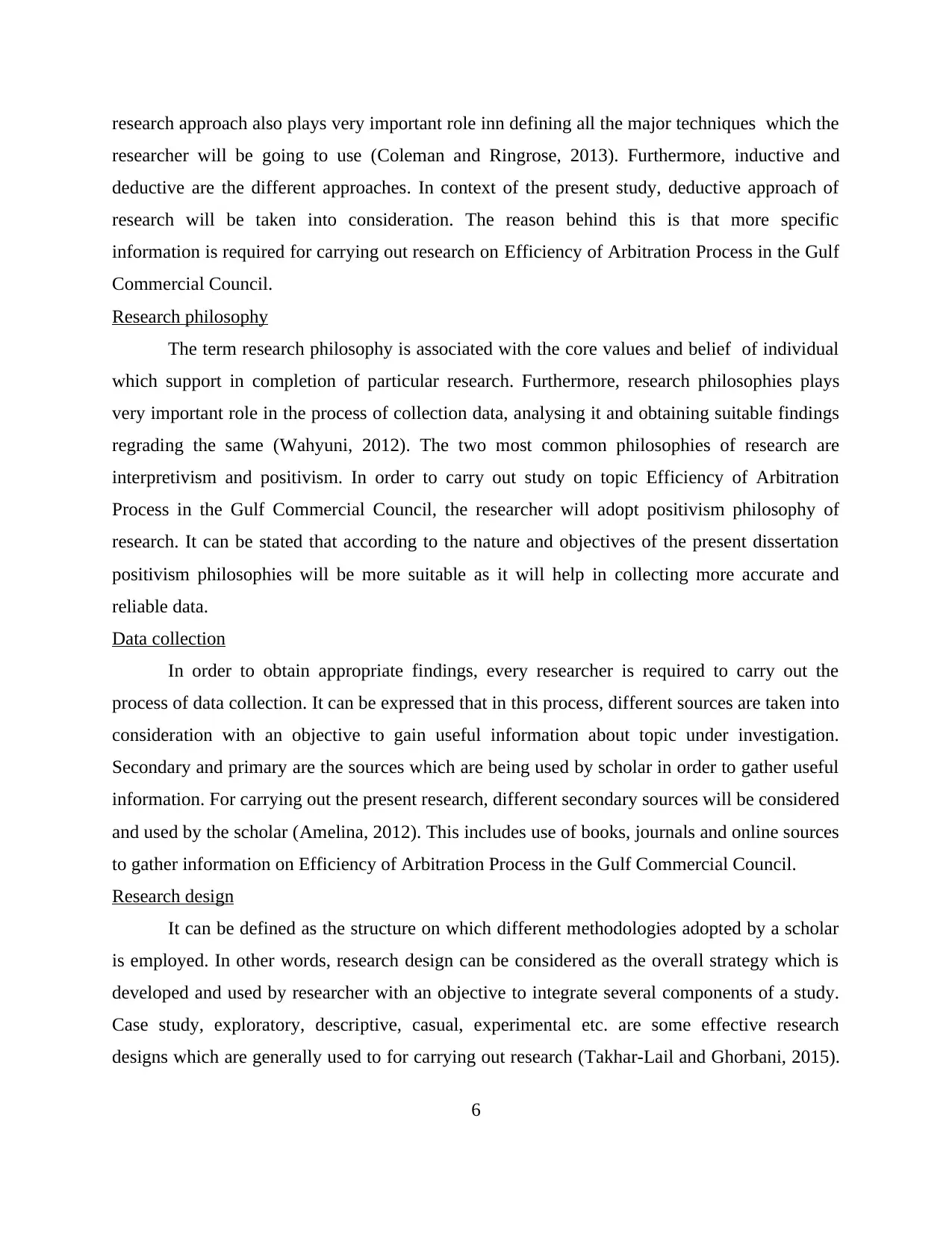
research approach also plays very important role inn defining all the major techniques which the
researcher will be going to use (Coleman and Ringrose, 2013). Furthermore, inductive and
deductive are the different approaches. In context of the present study, deductive approach of
research will be taken into consideration. The reason behind this is that more specific
information is required for carrying out research on Efficiency of Arbitration Process in the Gulf
Commercial Council.
Research philosophy
The term research philosophy is associated with the core values and belief of individual
which support in completion of particular research. Furthermore, research philosophies plays
very important role in the process of collection data, analysing it and obtaining suitable findings
regrading the same (Wahyuni, 2012). The two most common philosophies of research are
interpretivism and positivism. In order to carry out study on topic Efficiency of Arbitration
Process in the Gulf Commercial Council, the researcher will adopt positivism philosophy of
research. It can be stated that according to the nature and objectives of the present dissertation
positivism philosophies will be more suitable as it will help in collecting more accurate and
reliable data.
Data collection
In order to obtain appropriate findings, every researcher is required to carry out the
process of data collection. It can be expressed that in this process, different sources are taken into
consideration with an objective to gain useful information about topic under investigation.
Secondary and primary are the sources which are being used by scholar in order to gather useful
information. For carrying out the present research, different secondary sources will be considered
and used by the scholar (Amelina, 2012). This includes use of books, journals and online sources
to gather information on Efficiency of Arbitration Process in the Gulf Commercial Council.
Research design
It can be defined as the structure on which different methodologies adopted by a scholar
is employed. In other words, research design can be considered as the overall strategy which is
developed and used by researcher with an objective to integrate several components of a study.
Case study, exploratory, descriptive, casual, experimental etc. are some effective research
designs which are generally used to for carrying out research (Takhar-Lail and Ghorbani, 2015).
6
researcher will be going to use (Coleman and Ringrose, 2013). Furthermore, inductive and
deductive are the different approaches. In context of the present study, deductive approach of
research will be taken into consideration. The reason behind this is that more specific
information is required for carrying out research on Efficiency of Arbitration Process in the Gulf
Commercial Council.
Research philosophy
The term research philosophy is associated with the core values and belief of individual
which support in completion of particular research. Furthermore, research philosophies plays
very important role in the process of collection data, analysing it and obtaining suitable findings
regrading the same (Wahyuni, 2012). The two most common philosophies of research are
interpretivism and positivism. In order to carry out study on topic Efficiency of Arbitration
Process in the Gulf Commercial Council, the researcher will adopt positivism philosophy of
research. It can be stated that according to the nature and objectives of the present dissertation
positivism philosophies will be more suitable as it will help in collecting more accurate and
reliable data.
Data collection
In order to obtain appropriate findings, every researcher is required to carry out the
process of data collection. It can be expressed that in this process, different sources are taken into
consideration with an objective to gain useful information about topic under investigation.
Secondary and primary are the sources which are being used by scholar in order to gather useful
information. For carrying out the present research, different secondary sources will be considered
and used by the scholar (Amelina, 2012). This includes use of books, journals and online sources
to gather information on Efficiency of Arbitration Process in the Gulf Commercial Council.
Research design
It can be defined as the structure on which different methodologies adopted by a scholar
is employed. In other words, research design can be considered as the overall strategy which is
developed and used by researcher with an objective to integrate several components of a study.
Case study, exploratory, descriptive, casual, experimental etc. are some effective research
designs which are generally used to for carrying out research (Takhar-Lail and Ghorbani, 2015).
6
⊘ This is a preview!⊘
Do you want full access?
Subscribe today to unlock all pages.

Trusted by 1+ million students worldwide
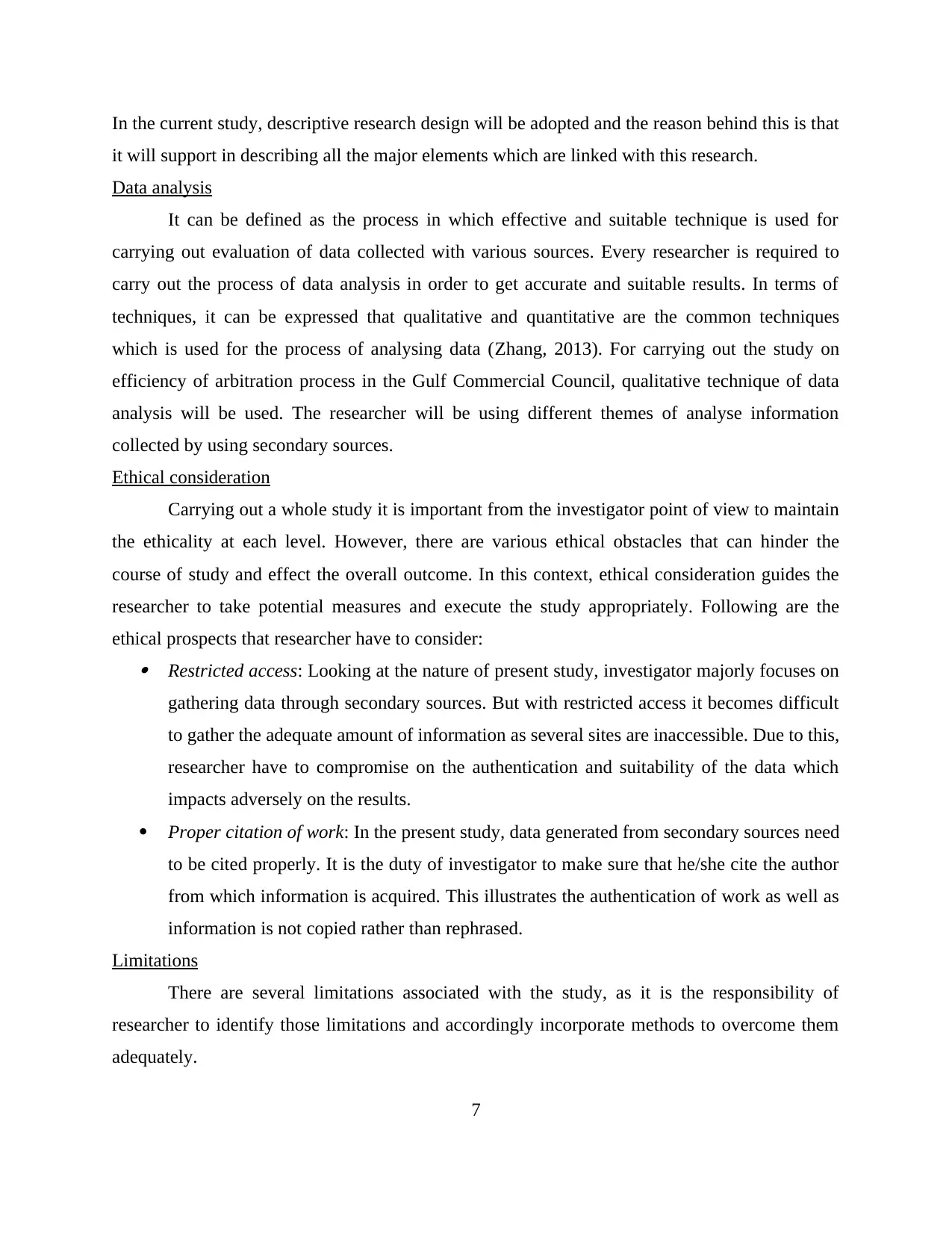
In the current study, descriptive research design will be adopted and the reason behind this is that
it will support in describing all the major elements which are linked with this research.
Data analysis
It can be defined as the process in which effective and suitable technique is used for
carrying out evaluation of data collected with various sources. Every researcher is required to
carry out the process of data analysis in order to get accurate and suitable results. In terms of
techniques, it can be expressed that qualitative and quantitative are the common techniques
which is used for the process of analysing data (Zhang, 2013). For carrying out the study on
efficiency of arbitration process in the Gulf Commercial Council, qualitative technique of data
analysis will be used. The researcher will be using different themes of analyse information
collected by using secondary sources.
Ethical consideration
Carrying out a whole study it is important from the investigator point of view to maintain
the ethicality at each level. However, there are various ethical obstacles that can hinder the
course of study and effect the overall outcome. In this context, ethical consideration guides the
researcher to take potential measures and execute the study appropriately. Following are the
ethical prospects that researcher have to consider: Restricted access: Looking at the nature of present study, investigator majorly focuses on
gathering data through secondary sources. But with restricted access it becomes difficult
to gather the adequate amount of information as several sites are inaccessible. Due to this,
researcher have to compromise on the authentication and suitability of the data which
impacts adversely on the results.
Proper citation of work: In the present study, data generated from secondary sources need
to be cited properly. It is the duty of investigator to make sure that he/she cite the author
from which information is acquired. This illustrates the authentication of work as well as
information is not copied rather than rephrased.
Limitations
There are several limitations associated with the study, as it is the responsibility of
researcher to identify those limitations and accordingly incorporate methods to overcome them
adequately.
7
it will support in describing all the major elements which are linked with this research.
Data analysis
It can be defined as the process in which effective and suitable technique is used for
carrying out evaluation of data collected with various sources. Every researcher is required to
carry out the process of data analysis in order to get accurate and suitable results. In terms of
techniques, it can be expressed that qualitative and quantitative are the common techniques
which is used for the process of analysing data (Zhang, 2013). For carrying out the study on
efficiency of arbitration process in the Gulf Commercial Council, qualitative technique of data
analysis will be used. The researcher will be using different themes of analyse information
collected by using secondary sources.
Ethical consideration
Carrying out a whole study it is important from the investigator point of view to maintain
the ethicality at each level. However, there are various ethical obstacles that can hinder the
course of study and effect the overall outcome. In this context, ethical consideration guides the
researcher to take potential measures and execute the study appropriately. Following are the
ethical prospects that researcher have to consider: Restricted access: Looking at the nature of present study, investigator majorly focuses on
gathering data through secondary sources. But with restricted access it becomes difficult
to gather the adequate amount of information as several sites are inaccessible. Due to this,
researcher have to compromise on the authentication and suitability of the data which
impacts adversely on the results.
Proper citation of work: In the present study, data generated from secondary sources need
to be cited properly. It is the duty of investigator to make sure that he/she cite the author
from which information is acquired. This illustrates the authentication of work as well as
information is not copied rather than rephrased.
Limitations
There are several limitations associated with the study, as it is the responsibility of
researcher to identify those limitations and accordingly incorporate methods to overcome them
adequately.
7
Paraphrase This Document
Need a fresh take? Get an instant paraphrase of this document with our AI Paraphraser
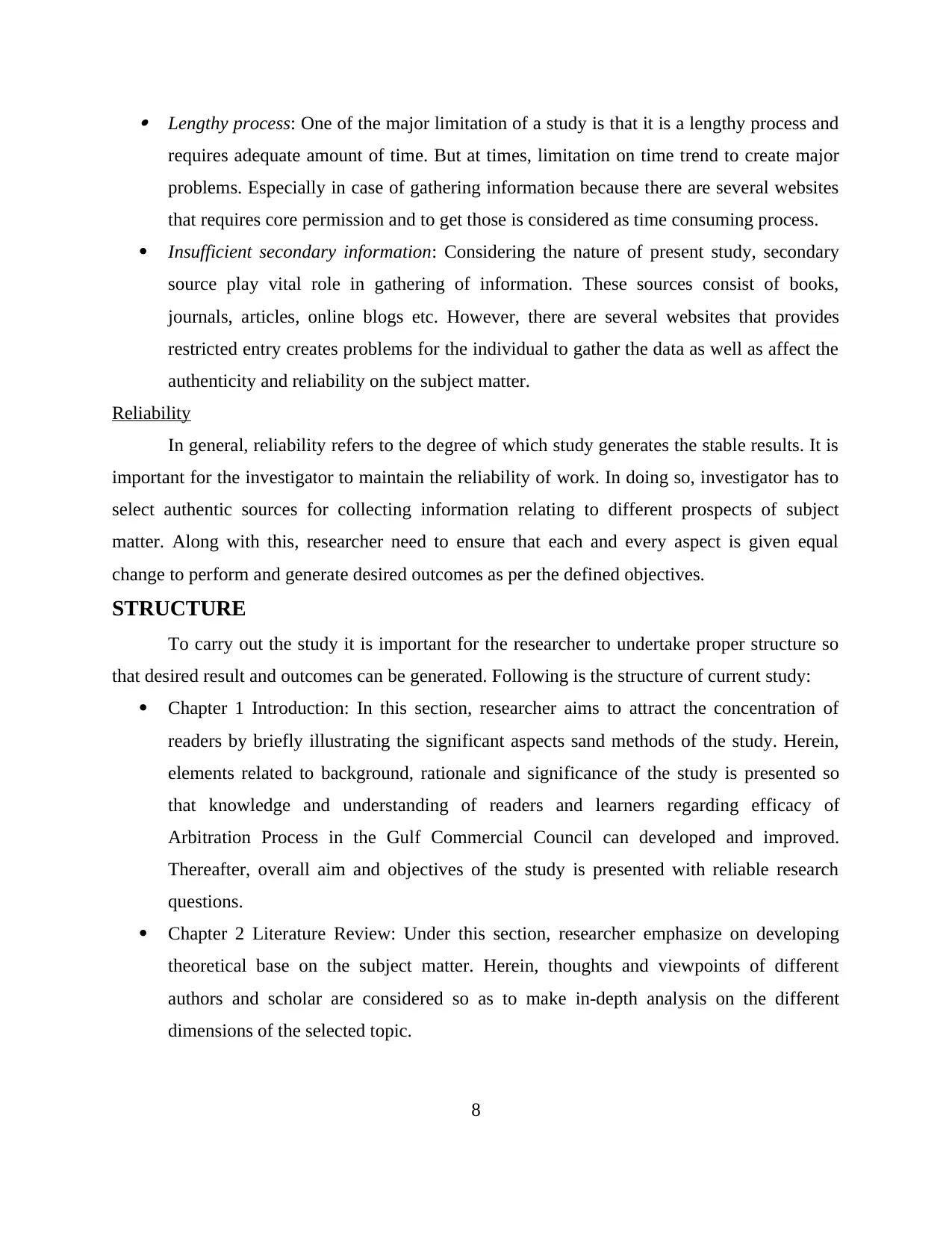
Lengthy process: One of the major limitation of a study is that it is a lengthy process and
requires adequate amount of time. But at times, limitation on time trend to create major
problems. Especially in case of gathering information because there are several websites
that requires core permission and to get those is considered as time consuming process.
Insufficient secondary information: Considering the nature of present study, secondary
source play vital role in gathering of information. These sources consist of books,
journals, articles, online blogs etc. However, there are several websites that provides
restricted entry creates problems for the individual to gather the data as well as affect the
authenticity and reliability on the subject matter.
Reliability
In general, reliability refers to the degree of which study generates the stable results. It is
important for the investigator to maintain the reliability of work. In doing so, investigator has to
select authentic sources for collecting information relating to different prospects of subject
matter. Along with this, researcher need to ensure that each and every aspect is given equal
change to perform and generate desired outcomes as per the defined objectives.
STRUCTURE
To carry out the study it is important for the researcher to undertake proper structure so
that desired result and outcomes can be generated. Following is the structure of current study:
Chapter 1 Introduction: In this section, researcher aims to attract the concentration of
readers by briefly illustrating the significant aspects sand methods of the study. Herein,
elements related to background, rationale and significance of the study is presented so
that knowledge and understanding of readers and learners regarding efficacy of
Arbitration Process in the Gulf Commercial Council can developed and improved.
Thereafter, overall aim and objectives of the study is presented with reliable research
questions.
Chapter 2 Literature Review: Under this section, researcher emphasize on developing
theoretical base on the subject matter. Herein, thoughts and viewpoints of different
authors and scholar are considered so as to make in-depth analysis on the different
dimensions of the selected topic.
8
requires adequate amount of time. But at times, limitation on time trend to create major
problems. Especially in case of gathering information because there are several websites
that requires core permission and to get those is considered as time consuming process.
Insufficient secondary information: Considering the nature of present study, secondary
source play vital role in gathering of information. These sources consist of books,
journals, articles, online blogs etc. However, there are several websites that provides
restricted entry creates problems for the individual to gather the data as well as affect the
authenticity and reliability on the subject matter.
Reliability
In general, reliability refers to the degree of which study generates the stable results. It is
important for the investigator to maintain the reliability of work. In doing so, investigator has to
select authentic sources for collecting information relating to different prospects of subject
matter. Along with this, researcher need to ensure that each and every aspect is given equal
change to perform and generate desired outcomes as per the defined objectives.
STRUCTURE
To carry out the study it is important for the researcher to undertake proper structure so
that desired result and outcomes can be generated. Following is the structure of current study:
Chapter 1 Introduction: In this section, researcher aims to attract the concentration of
readers by briefly illustrating the significant aspects sand methods of the study. Herein,
elements related to background, rationale and significance of the study is presented so
that knowledge and understanding of readers and learners regarding efficacy of
Arbitration Process in the Gulf Commercial Council can developed and improved.
Thereafter, overall aim and objectives of the study is presented with reliable research
questions.
Chapter 2 Literature Review: Under this section, researcher emphasize on developing
theoretical base on the subject matter. Herein, thoughts and viewpoints of different
authors and scholar are considered so as to make in-depth analysis on the different
dimensions of the selected topic.
8
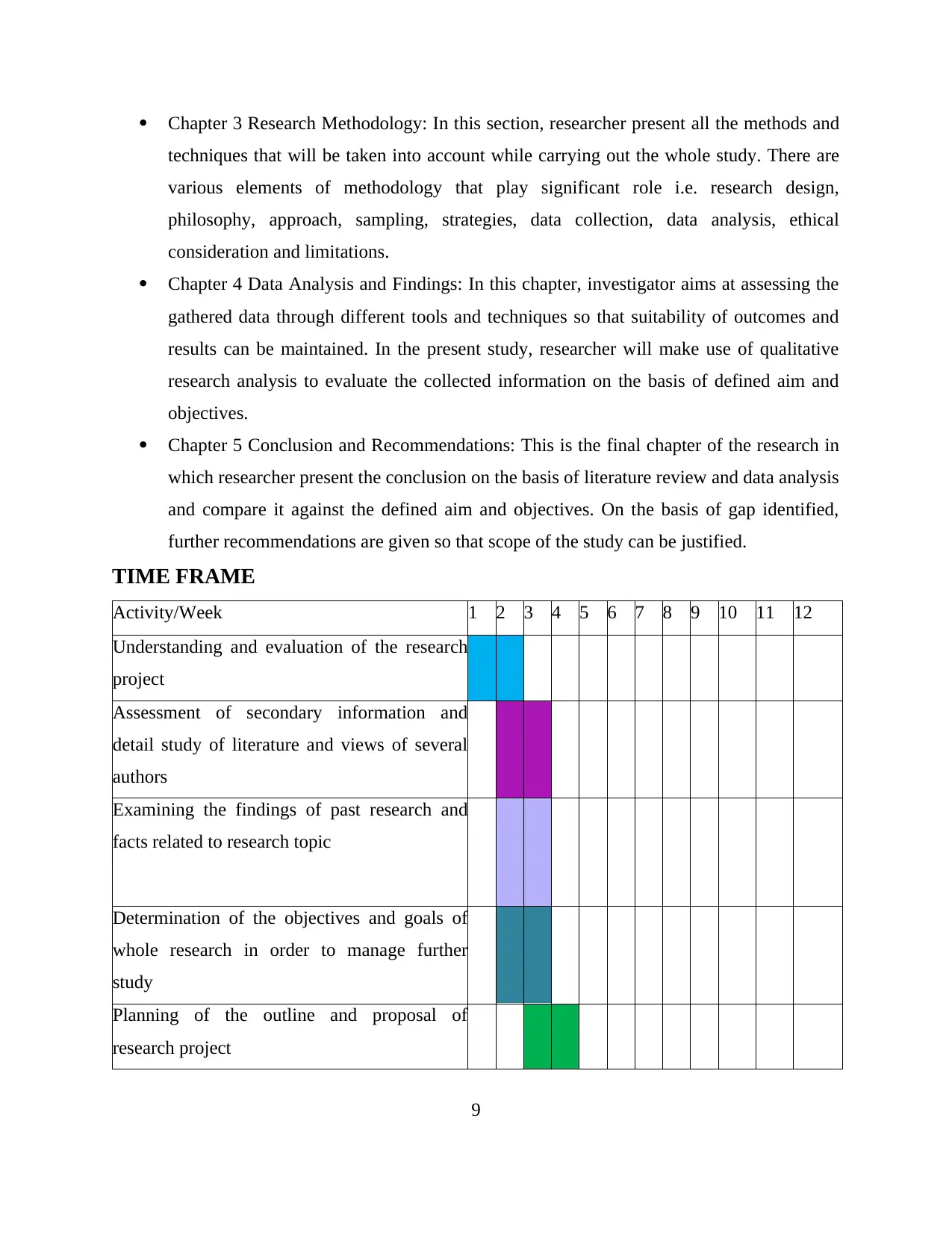
Chapter 3 Research Methodology: In this section, researcher present all the methods and
techniques that will be taken into account while carrying out the whole study. There are
various elements of methodology that play significant role i.e. research design,
philosophy, approach, sampling, strategies, data collection, data analysis, ethical
consideration and limitations.
Chapter 4 Data Analysis and Findings: In this chapter, investigator aims at assessing the
gathered data through different tools and techniques so that suitability of outcomes and
results can be maintained. In the present study, researcher will make use of qualitative
research analysis to evaluate the collected information on the basis of defined aim and
objectives.
Chapter 5 Conclusion and Recommendations: This is the final chapter of the research in
which researcher present the conclusion on the basis of literature review and data analysis
and compare it against the defined aim and objectives. On the basis of gap identified,
further recommendations are given so that scope of the study can be justified.
TIME FRAME
Activity/Week 1 2 3 4 5 6 7 8 9 10 11 12
Understanding and evaluation of the research
project
Assessment of secondary information and
detail study of literature and views of several
authors
Examining the findings of past research and
facts related to research topic
Determination of the objectives and goals of
whole research in order to manage further
study
Planning of the outline and proposal of
research project
9
techniques that will be taken into account while carrying out the whole study. There are
various elements of methodology that play significant role i.e. research design,
philosophy, approach, sampling, strategies, data collection, data analysis, ethical
consideration and limitations.
Chapter 4 Data Analysis and Findings: In this chapter, investigator aims at assessing the
gathered data through different tools and techniques so that suitability of outcomes and
results can be maintained. In the present study, researcher will make use of qualitative
research analysis to evaluate the collected information on the basis of defined aim and
objectives.
Chapter 5 Conclusion and Recommendations: This is the final chapter of the research in
which researcher present the conclusion on the basis of literature review and data analysis
and compare it against the defined aim and objectives. On the basis of gap identified,
further recommendations are given so that scope of the study can be justified.
TIME FRAME
Activity/Week 1 2 3 4 5 6 7 8 9 10 11 12
Understanding and evaluation of the research
project
Assessment of secondary information and
detail study of literature and views of several
authors
Examining the findings of past research and
facts related to research topic
Determination of the objectives and goals of
whole research in order to manage further
study
Planning of the outline and proposal of
research project
9
⊘ This is a preview!⊘
Do you want full access?
Subscribe today to unlock all pages.

Trusted by 1+ million students worldwide
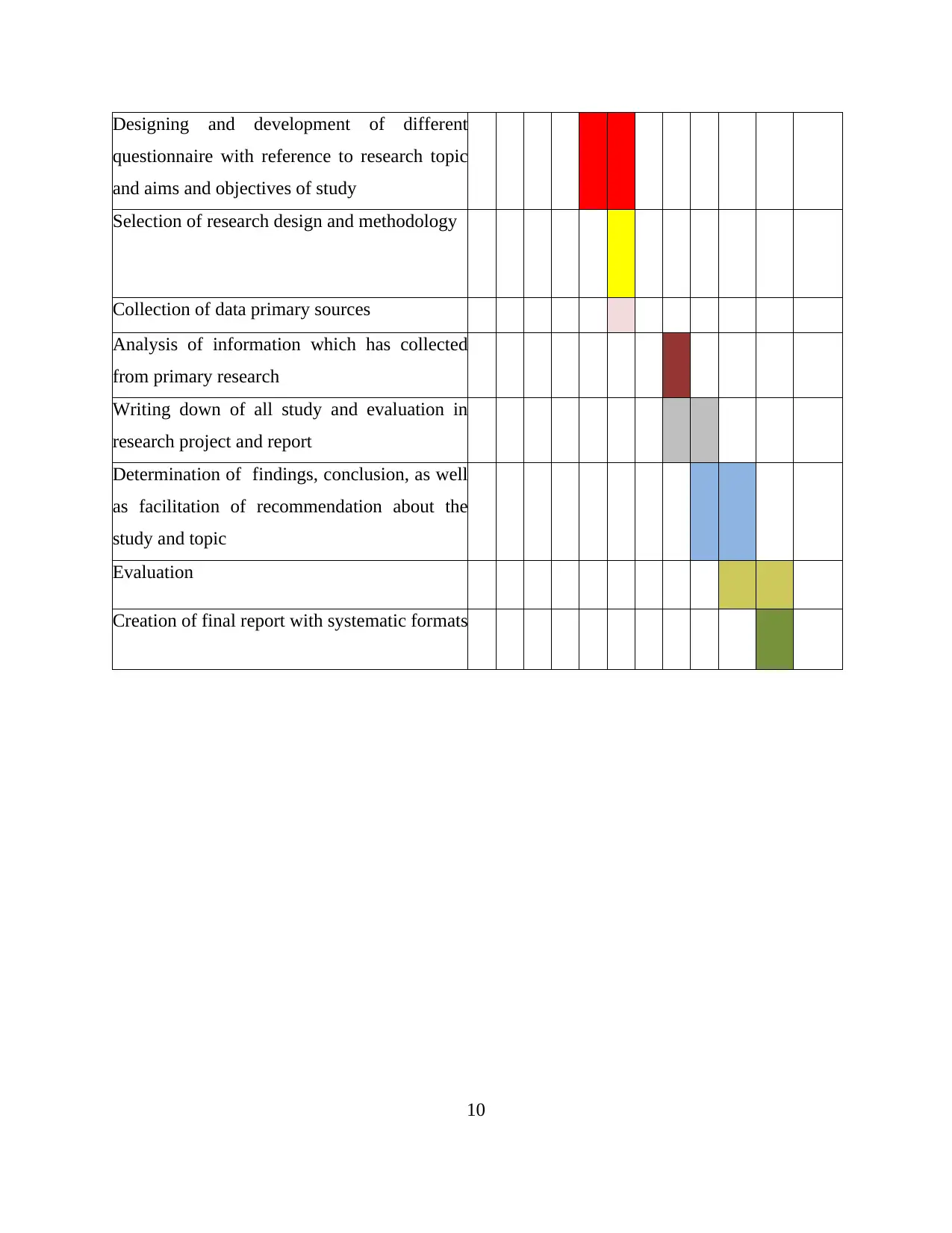
Designing and development of different
questionnaire with reference to research topic
and aims and objectives of study
Selection of research design and methodology
Collection of data primary sources
Analysis of information which has collected
from primary research
Writing down of all study and evaluation in
research project and report
Determination of findings, conclusion, as well
as facilitation of recommendation about the
study and topic
Evaluation
Creation of final report with systematic formats
10
questionnaire with reference to research topic
and aims and objectives of study
Selection of research design and methodology
Collection of data primary sources
Analysis of information which has collected
from primary research
Writing down of all study and evaluation in
research project and report
Determination of findings, conclusion, as well
as facilitation of recommendation about the
study and topic
Evaluation
Creation of final report with systematic formats
10
Paraphrase This Document
Need a fresh take? Get an instant paraphrase of this document with our AI Paraphraser
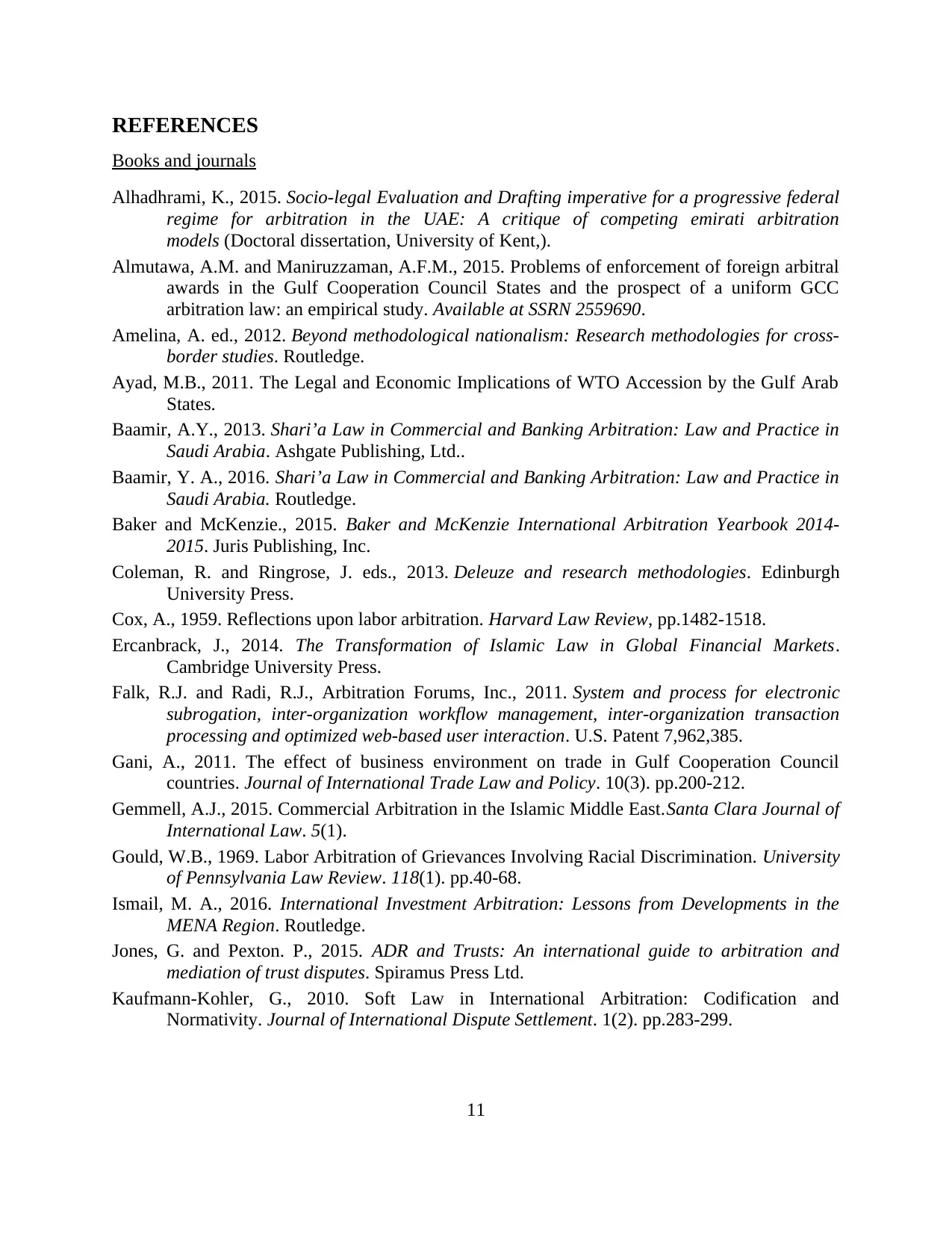
REFERENCES
Books and journals
Alhadhrami, K., 2015. Socio-legal Evaluation and Drafting imperative for a progressive federal
regime for arbitration in the UAE: A critique of competing emirati arbitration
models (Doctoral dissertation, University of Kent,).
Almutawa, A.M. and Maniruzzaman, A.F.M., 2015. Problems of enforcement of foreign arbitral
awards in the Gulf Cooperation Council States and the prospect of a uniform GCC
arbitration law: an empirical study. Available at SSRN 2559690.
Amelina, A. ed., 2012. Beyond methodological nationalism: Research methodologies for cross-
border studies. Routledge.
Ayad, M.B., 2011. The Legal and Economic Implications of WTO Accession by the Gulf Arab
States.
Baamir, A.Y., 2013. Shari’a Law in Commercial and Banking Arbitration: Law and Practice in
Saudi Arabia. Ashgate Publishing, Ltd..
Baamir, Y. A., 2016. Shari’a Law in Commercial and Banking Arbitration: Law and Practice in
Saudi Arabia. Routledge.
Baker and McKenzie., 2015. Baker and McKenzie International Arbitration Yearbook 2014-
2015. Juris Publishing, Inc.
Coleman, R. and Ringrose, J. eds., 2013. Deleuze and research methodologies. Edinburgh
University Press.
Cox, A., 1959. Reflections upon labor arbitration. Harvard Law Review, pp.1482-1518.
Ercanbrack, J., 2014. The Transformation of Islamic Law in Global Financial Markets.
Cambridge University Press.
Falk, R.J. and Radi, R.J., Arbitration Forums, Inc., 2011. System and process for electronic
subrogation, inter-organization workflow management, inter-organization transaction
processing and optimized web-based user interaction. U.S. Patent 7,962,385.
Gani, A., 2011. The effect of business environment on trade in Gulf Cooperation Council
countries. Journal of International Trade Law and Policy. 10(3). pp.200-212.
Gemmell, A.J., 2015. Commercial Arbitration in the Islamic Middle East.Santa Clara Journal of
International Law. 5(1).
Gould, W.B., 1969. Labor Arbitration of Grievances Involving Racial Discrimination. University
of Pennsylvania Law Review. 118(1). pp.40-68.
Ismail, M. A., 2016. International Investment Arbitration: Lessons from Developments in the
MENA Region. Routledge.
Jones, G. and Pexton. P., 2015. ADR and Trusts: An international guide to arbitration and
mediation of trust disputes. Spiramus Press Ltd.
Kaufmann-Kohler, G., 2010. Soft Law in International Arbitration: Codification and
Normativity. Journal of International Dispute Settlement. 1(2). pp.283-299.
11
Books and journals
Alhadhrami, K., 2015. Socio-legal Evaluation and Drafting imperative for a progressive federal
regime for arbitration in the UAE: A critique of competing emirati arbitration
models (Doctoral dissertation, University of Kent,).
Almutawa, A.M. and Maniruzzaman, A.F.M., 2015. Problems of enforcement of foreign arbitral
awards in the Gulf Cooperation Council States and the prospect of a uniform GCC
arbitration law: an empirical study. Available at SSRN 2559690.
Amelina, A. ed., 2012. Beyond methodological nationalism: Research methodologies for cross-
border studies. Routledge.
Ayad, M.B., 2011. The Legal and Economic Implications of WTO Accession by the Gulf Arab
States.
Baamir, A.Y., 2013. Shari’a Law in Commercial and Banking Arbitration: Law and Practice in
Saudi Arabia. Ashgate Publishing, Ltd..
Baamir, Y. A., 2016. Shari’a Law in Commercial and Banking Arbitration: Law and Practice in
Saudi Arabia. Routledge.
Baker and McKenzie., 2015. Baker and McKenzie International Arbitration Yearbook 2014-
2015. Juris Publishing, Inc.
Coleman, R. and Ringrose, J. eds., 2013. Deleuze and research methodologies. Edinburgh
University Press.
Cox, A., 1959. Reflections upon labor arbitration. Harvard Law Review, pp.1482-1518.
Ercanbrack, J., 2014. The Transformation of Islamic Law in Global Financial Markets.
Cambridge University Press.
Falk, R.J. and Radi, R.J., Arbitration Forums, Inc., 2011. System and process for electronic
subrogation, inter-organization workflow management, inter-organization transaction
processing and optimized web-based user interaction. U.S. Patent 7,962,385.
Gani, A., 2011. The effect of business environment on trade in Gulf Cooperation Council
countries. Journal of International Trade Law and Policy. 10(3). pp.200-212.
Gemmell, A.J., 2015. Commercial Arbitration in the Islamic Middle East.Santa Clara Journal of
International Law. 5(1).
Gould, W.B., 1969. Labor Arbitration of Grievances Involving Racial Discrimination. University
of Pennsylvania Law Review. 118(1). pp.40-68.
Ismail, M. A., 2016. International Investment Arbitration: Lessons from Developments in the
MENA Region. Routledge.
Jones, G. and Pexton. P., 2015. ADR and Trusts: An international guide to arbitration and
mediation of trust disputes. Spiramus Press Ltd.
Kaufmann-Kohler, G., 2010. Soft Law in International Arbitration: Codification and
Normativity. Journal of International Dispute Settlement. 1(2). pp.283-299.
11
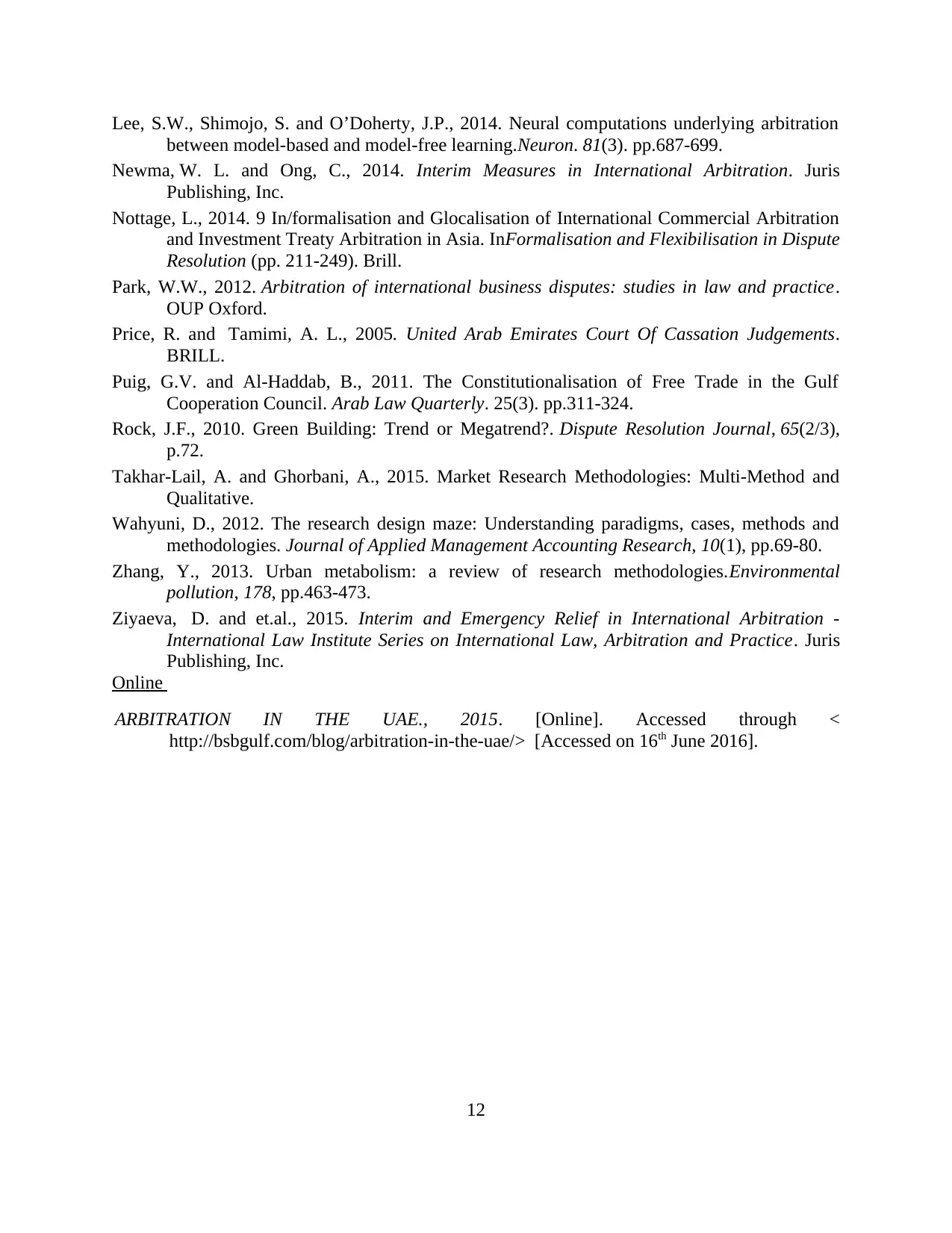
Lee, S.W., Shimojo, S. and O’Doherty, J.P., 2014. Neural computations underlying arbitration
between model-based and model-free learning.Neuron. 81(3). pp.687-699.
Newma, W. L. and Ong, C., 2014. Interim Measures in International Arbitration. Juris
Publishing, Inc.
Nottage, L., 2014. 9 In/formalisation and Glocalisation of International Commercial Arbitration
and Investment Treaty Arbitration in Asia. InFormalisation and Flexibilisation in Dispute
Resolution (pp. 211-249). Brill.
Park, W.W., 2012. Arbitration of international business disputes: studies in law and practice.
OUP Oxford.
Price, R. and Tamimi, A. L., 2005. United Arab Emirates Court Of Cassation Judgements.
BRILL.
Puig, G.V. and Al-Haddab, B., 2011. The Constitutionalisation of Free Trade in the Gulf
Cooperation Council. Arab Law Quarterly. 25(3). pp.311-324.
Rock, J.F., 2010. Green Building: Trend or Megatrend?. Dispute Resolution Journal, 65(2/3),
p.72.
Takhar-Lail, A. and Ghorbani, A., 2015. Market Research Methodologies: Multi-Method and
Qualitative.
Wahyuni, D., 2012. The research design maze: Understanding paradigms, cases, methods and
methodologies. Journal of Applied Management Accounting Research, 10(1), pp.69-80.
Zhang, Y., 2013. Urban metabolism: a review of research methodologies.Environmental
pollution, 178, pp.463-473.
Ziyaeva, D. and et.al., 2015. Interim and Emergency Relief in International Arbitration -
International Law Institute Series on International Law, Arbitration and Practice. Juris
Publishing, Inc.
Online
ARBITRATION IN THE UAE., 2015. [Online]. Accessed through <
http://bsbgulf.com/blog/arbitration-in-the-uae/> [Accessed on 16th June 2016].
12
between model-based and model-free learning.Neuron. 81(3). pp.687-699.
Newma, W. L. and Ong, C., 2014. Interim Measures in International Arbitration. Juris
Publishing, Inc.
Nottage, L., 2014. 9 In/formalisation and Glocalisation of International Commercial Arbitration
and Investment Treaty Arbitration in Asia. InFormalisation and Flexibilisation in Dispute
Resolution (pp. 211-249). Brill.
Park, W.W., 2012. Arbitration of international business disputes: studies in law and practice.
OUP Oxford.
Price, R. and Tamimi, A. L., 2005. United Arab Emirates Court Of Cassation Judgements.
BRILL.
Puig, G.V. and Al-Haddab, B., 2011. The Constitutionalisation of Free Trade in the Gulf
Cooperation Council. Arab Law Quarterly. 25(3). pp.311-324.
Rock, J.F., 2010. Green Building: Trend or Megatrend?. Dispute Resolution Journal, 65(2/3),
p.72.
Takhar-Lail, A. and Ghorbani, A., 2015. Market Research Methodologies: Multi-Method and
Qualitative.
Wahyuni, D., 2012. The research design maze: Understanding paradigms, cases, methods and
methodologies. Journal of Applied Management Accounting Research, 10(1), pp.69-80.
Zhang, Y., 2013. Urban metabolism: a review of research methodologies.Environmental
pollution, 178, pp.463-473.
Ziyaeva, D. and et.al., 2015. Interim and Emergency Relief in International Arbitration -
International Law Institute Series on International Law, Arbitration and Practice. Juris
Publishing, Inc.
Online
ARBITRATION IN THE UAE., 2015. [Online]. Accessed through <
http://bsbgulf.com/blog/arbitration-in-the-uae/> [Accessed on 16th June 2016].
12
⊘ This is a preview!⊘
Do you want full access?
Subscribe today to unlock all pages.

Trusted by 1+ million students worldwide
1 out of 12
Your All-in-One AI-Powered Toolkit for Academic Success.
+13062052269
info@desklib.com
Available 24*7 on WhatsApp / Email
![[object Object]](/_next/static/media/star-bottom.7253800d.svg)
Unlock your academic potential
Copyright © 2020–2026 A2Z Services. All Rights Reserved. Developed and managed by ZUCOL.